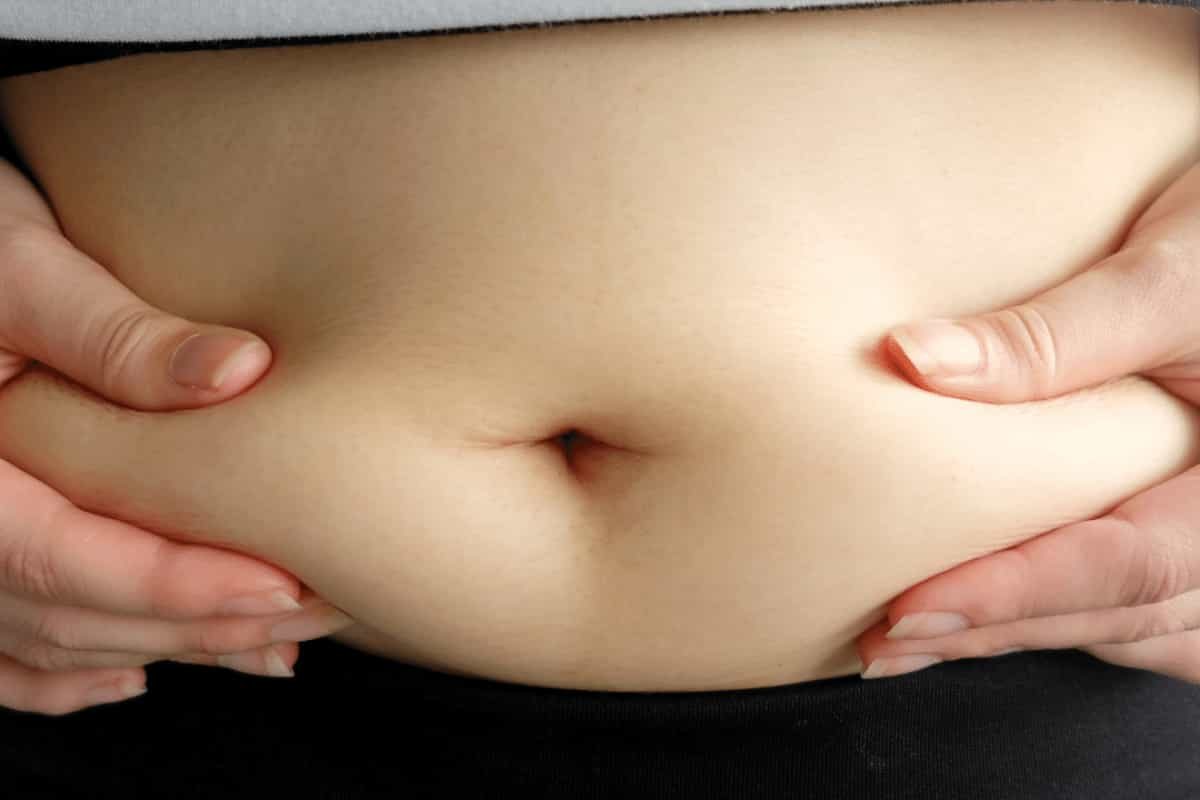Losing Your Meno 10 – Menopause Weight Loss Tips

Are you experiencing weight gain during menopause, often referred to as the “meno 10?” Just like the infamous “freshman 15,” weight gain is common around this time of your life. In this article, we explore the relationship between menopause and weight gain and offer practical ideas to manage this extra weight.
Why Is Weight Gain Common During Menopause?
The meno 10 seems to be linked to the natural fluctuations in estrogen levels during midlife. As a result, your bodies tend to accumulate weight more easily as you age.
For many women, weight gain starts during perimenopause, which can begin a decade before actual menopause. Factors like a slowed metabolism, loss of muscle mass, increased insulin resistance, and disrupted sleep contribute to this phenomenon.
Interestingly, menopause also appears to influence where women gain weight—the abdomen. The accumulation of weight around the stomach, known as central body fat or “belly fat,” is associated with an increased risk of metabolic disturbances, blood sugar issues, blood pressure problems, and cardiovascular disease, which is the leading cause of death in postmenopausal women.
Weight gain during midlife is also linked to an increased risk of various health conditions such as cancer, arthritis, mood disorders, and sexual dysfunction. Women with high BMI and more body fat may also experience more severe and frequent menopausal symptoms like hot flashes.
Can You Prevent or Stop Weight Gain During Menopause?
The average woman—of any body weight or ethnicity—gains 1.5 pounds per year during their 50s and 60s. However, adopting healthy lifestyle habits can prevent and manage this weight gain during menopause.
It’s never too late to improve your health and lose weight. Proper nutrition and regular exercise play essential roles in overall health, and menopause is no exception. Don’t forget the other important factors that contribute to weight gain, such as disrupted sleep and high stress levels.
If you think that your nutrition, exercise, stress or sleep need some expert guidance, consider speaking to your healthcare professional or your Midday menopause coach to develop a plan for lifestyle changes.
Can Other Health Conditions Cause Weight Gain During Menopause?
In some cases, weight gain during menopause may be attributed to a health condition such as an underactive thyroid (hypothyroidism). Symptoms of hypothyroidism are very similar to menopause, so it’s often hard to differentiate the two without blood tests to evaluate thyroid hormone levels.
Symptoms of an underactive thyroid include dry skin, cold intolerance, mood changes, forgetfulness, constipation, and alterations in libido. To determine if you have an underactive thyroid, consult your doctor, who can conduct a simple blood test.
Why Is It So Hard to Lose Weight in Menopause?
Low estrogen, mood changes, and sleep disturbances can all contribute to weight gain and make it difficult to maintain a consistent weight.
Feeling overwhelmed, down, or discouraged can also hinder your progress in achieving weight loss goals. Depressed or anxious feelings are common parts of the menopause experience that can make it challenging to get through your day, much less focus on staying consistent with your weight management goals.
Taking small steps, one change at a time, can help turn the tide on your mood and your physical health. Exercise is even more effective than medication for improving mood, and has the added benefit of helping with weight management.
Choosing to minimize alcohol and caffeine can both improve your mood during the day and help you sleep better. Reducing your added sugar intake can both help with weight gain and reduce mood “crashes” during the day.
You’re not alone if your mental health feels like a barrier to healthy lifestyle changes. The good news is that the same changes that help your physical body can also have a major impact on your emotional health.
Don’t try to overhaul your life all at once—choose one manageable change, set a SMART goal (see the article below) and get that habit to stick before adding another.
How Can You Lose Stubborn Belly Fat?
“Spot reduction” (selectively losing fat from one area of the body) is unfortunately a myth. However, reducing your overall body fat percentage can help address the weight gain around your middle that often comes with menopause.
Creating a calorie deficit—consuming fewer calories than your body uses—is essential for losing weight. However, calorie reductions should be small and gradual so you don’t create an unhealthy stress on your body. Especially if you’re starting to exercise more, huge calorie deficits can actually cause more harm than good.
For personalized nutrition support, consider consulting a registered dietitian. They can help you develop a meal plan tailored to your specific goals during menopause.
You can find a local dietitian or one providing virtual counseling who specializes in women’s health and weight loss. A great place to start is the Academy of Nutrition and Dietetics provider registry.
What Are the Best Exercises to Lose Weight During Menopause?
Cutting calories without adding exercise will actually risk losing muscle mass instead of fat. Remember—you want to reduce your body fat percentage, not just lose weight by reducing your muscle mass.
Experts agree that the best exercise program to support weight loss combines aerobic (cardio) exercise with strength training.
If you’re new to exercise, trying something new, or greatly increasing your intensity or volume of movement, consult your healthcare provider. If you have heart disease or high blood pressure, seek medical clearance before beginning an exercise program.
Aerobic Exercise Recommendations
150min of moderate intensity per week
Moderate intensity means that you can talk but not sing
75min of high intensity per week
High intensity means that you can’t talk—it’s intense!
There’s some evidence that high intensity training can be more effective for weight loss. However, high intensity training is no joke. If you’re new to exercise or returning after a long period without regular cardiovascular training, build a base of moderate level exercise before you ramp up the intensity.
Strength Training
At least two sessions per week working all the major muscle groups
Strength training exercise requires you to move against resistance from your bodyweight, bands or weights.
Whether you use lower or higher weights, you must reach fatigue (the point where you can barely continue) on each set and complete at least two sets for each exercise.
Reaching fatigue can take a long time with light weights and is much faster with heavier weights. Heavier weights also have the added benefit of improving your bone density, while lighter weights are much less effective.
Read more about strength training here.
Nutrition Tips During Menopause
The Mediterranean diet, based on whole foods, has been associated with reduced cardiovascular disease risk and supports healthy weight loss. This diet emphasizes fruits, vegetables, whole grains, legumes, lean protein, nuts, and seeds, while incorporating moderate fat consumption.
Another option is a lower carbohydrate diet, especially reducing highly refined carbohydrates found in packaged snack foods. Such a diet has shown to aid in weight loss, particularly around the midsection.
Vegan and vegetarian diets are also helpful for weight loss and chronic disease prevention. While you do not necessarily have to completely eliminate animal products, try focusing on plant-based foods.
Regardless of your preferred eating pattern, making whole and minimally processed foods the foundation of your diet is an excellent starting point for managing menopause weight.
Sign up for more unique women’s health content
By submitting this form, you agree to the Lisa Health Privacy Policy and Terms of Use


